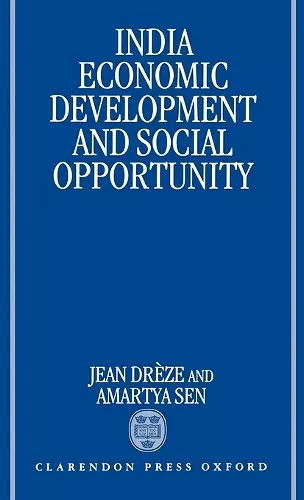India: Economic Development and Social Opportunity
Amartya Sen author Jean Drèze author
Format:Hardback
Publisher:Oxford University Press
Published:4th Apr '96
Currently unavailable, and unfortunately no date known when it will be back
This hardback is available in another edition too:
- Paperback£63.00(9780198295280)

An analysis of endemic deprivation in India and of the role of public action in addressing that problem. The analysis is based on a broad view of economic development, focusing on human well-being and `social opportunity' rather than on the standard indicators of economic growth. India's success in reducing endemic deprivation since Independence has been quite limited. Recent diagnoses of this failure of policy have concentrated on the counterproductive role of government regulation, and on the need for economic incentives to accelerate the growth of the economy. This book argues that an assessment of India's failure to eliminate basic deprivations has to go beyond this limited focus, and to take note of the role played in that failure by inadequate public involvement in the provision of basic education, health care, social security, and related fields, Even the fostering of fast and participatory economic growth requires some basic social change, which is not addressed by liberalization and economic incentives. The authors also discuss the historical antecedents of these political and social neglects, including the distortion of policy priorities arising from inequalities of political power. Following on from this, the book considers the scope for public action to address these earlier biases and achieve a transformation of policy priorities. The introductory chapter presents the motivation, focus, and approach of the book. Chapter 2 discusses the respective roles of the market mechanism and government action in economic development and discusses the particular role of public involvement in the fields of health and education. In chapters 3 and 4, international comparisons of development experiences are brought to bear on the diagnosis of India's successes and failures. These two chapters also discuss the lessons to be learnt from the contrasting development experiences of different states within India, with particular attention to Kerala's outstanding success in social fields. Chapter 5 considers the role of public action and political organization in promoting social opportunities. Attention is drawn, in particular, to the part played by widespread illiteracy in suppressing that process and perpetuating social inequalities. The issue of basic education is further examined in chapter 6, which includes a critical assessment of public policy in this field. Chapter 7 discusses the specific problem on gender inequality, and the role of women's agency in...
As a compendium of data on India's education system and, to a lesser extent its record on eliminating basic health problems and gender inequality, the book is without recent peer. * Financial Times *
As a compendium of data on India's education system ... the book is without recent peer. * India Financial Times *
The disappointing social statistics from India are today familiar matter, but nowhere will you find as intensive a collation of a number of them as in India: Economic Development and Social Opportunity, by Jean Dreze and Amartya Sen ... writtin throughout in a fine, journalistic style; and it will be a starting point of subsequent discussions on social life in India. * Times Higher Education Supplement *
They offer a commentary on data at the level of Indian state governments. * Times Higher Education Supplement *
important book * Martin Wolf, Financial Times *
In a broad comparative analysis of India's economic development, Dreze and Sen have dealt with a wide range of issues in this book. ... A significant merit of this book lies in the link that the authors establish between economic development and social opportunity. ... A rich selection of statistical data prefaced with a succinct explanatory note, a copious selection of appropriate bibliographical references, and meticulously drawn up indexes (by name and by subject), together constitute material of inestimable value. The strength of this book lies in the facility with which the authors handle complex philosophical and economic issues in an interpenetrating manner. This makes the book a crucially important addition to the literature on India's experience of economic development which students of social science can ill afford to ignore. * The Journal of Development Studies, vol.33, no.5, June 1997 *
ISBN: 9780198290124
Dimensions: 225mm x 145mm x 23mm
Weight: 515g
306 pages